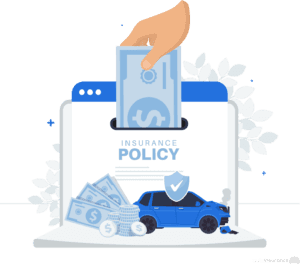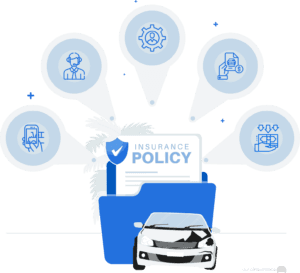

How Does Car Insurance Work?
What your car insurance covers and what happens if you get into an accident
Compare quotes from top providers

All states except New Hampshire and Virginia require drivers to have minimum amounts of car insurance. But many of us don’t quite understand our policies or the insurance process in general. We’ll go over what auto insurance does and doesn’t cover, how insurance payouts work, what to do if you get into an accident, and how insurance works when someone else drives your car.

How Does Car Insurance Work?
You pay an insurance premium regularly, and in exchange, your car insurance company protects you financially if you file a claim, like an accident or theft, that your policy covers. Your policy outlines the limits of your protection. For example, your insurance provider might cover property damage in the event of an accident, with a limit of $50,000 per accident.
But if you lack comprehensive coverage and your car is stolen, that won’t be covered and you’ll have to purchase another car out of pocket. That’s why the amount of coverage matters. If you don’t have full coverage, things like medical expenses may not be covered in at-fault accidents.
What Auto Insurance Covers
States have different minimum requirements for auto insurance. You might add coverages beyond the minimum, depending on your budget and desired level of protection. The following types of coverage are common:
- Liability: If you’re at fault in an accident, liability coverage pays for the damage. This includes damage to other vehicles and objects, injuries to other drivers and passengers, and lawsuits if another party sues you. Keep in mind that liability coverage does not pay for damages to your own vehicle; that’s collision coverage, detailed below.
- Collision: Unlike liability coverage, collision coverage protects your own vehicle in the event of an accident. This coverage kicks in if your vehicle collides with another vehicle or with a stationary object, or if your vehicle overturns.
- Comprehensive: Comprehensive coverage protects you if your car sustains damage due to events other than collisions. This includes things like theft (the car itself or a part like a catalytic converter), vandalism, falling trees, and flooding.
- Medical payments/personal injury protection (PIP): Both medical payments and PIP cover medical bills for you and your passengers in a car accident, regardless of who’s at fault. Medical payments coverage is available in most states, while PIP is available only in states where laws require it. Though the coverages overlap, PIP is more comprehensive.Fourteen states and Puerto Rico require medical payments, PIP, or similar coverage: Delaware, Florida, Hawaii, Kansas, Maine, Massachusetts, Michigan, Minnesota, New Jersey, New York, North Dakota, Oregon, Pennsylvania, and Utah. In Arkansas, D.C., Kentucky, Maryland, South Dakota, Texas, Virginia, and Washington, providers must offer PIP, but it’s not required.
- Uninsured/underinsured motorist coverage: If an uninsured or underinsured driver hits your vehicle, this covers injuries to you and your passengers, as well as damage to your vehicle.
- Other optional coverages: You can customize your policy to your needs by adding additional coverages, like gap insurance, new car replacement, rental car reimbursement, and more.1
What Auto Insurance Doesn’t Cover
Auto insurance does not cover wear and tear to your vehicle, so make sure you’re keeping up with regular maintenance such as oil changes. It also doesn’t cover driving for commercial purposes, like food delivery or ridesharing, unless you add rideshare coverage to your policy.2
DID YOU KNOW?
Standard auto insurance policies do not cover driving for commercial purposes, including Lyft and Uber. However, many insurance companies offer additional rideshare coverage. Ask your insurance provider about adding any needed coverage, and check out our roundup of the best auto insurance companies for rideshare.
How Car Insurance Payouts Work
Before your policy kicks in and your insurance company pays you for damages or bills, you’ll often have to pay a deductible. For example, let’s say you have a $500 deductible for your comprehensive coverage. If a tree falls on your car and causes $2,500 in damage, you will pay $500 and your insurance company will pay the remaining $2,000.
If your vehicle is totaled (i.e., if your vehicle sustains damages beyond repair or if the repairs cost more than the value of the vehicle), your insurance will pay you the value of the vehicle at the time of the loss. Keep in mind that if you owe more in loans than your car’s worth, you’ll have to pay the difference unless you have gap insurance.

How Car Insurance Works When You Get Into an Accident
Getting into an accident is stressful, and it’s hard to think clearly when it happens. That’s why it’s important to know what to do if someone hits your car ahead of time.
- Take notes: At the scene, take down as much information as you can. This includes taking photos of your vehicle and other vehicles; noting the date, time, and weather conditions; recording the make, model, color, and year of all vehicles involved; and exchanging contact, driver’s license, and insurance information with the other parties.
TIP
If you’re involved in an accident, collect as much information as you can at the scene. That includes taking photos of your vehicle and the other vehicle(s); noting the date, time, and weather conditions; recording the make, model, color, and year of the vehicle(s); and exchanging contact, driver’s license, and insurance information.
- Call your agent: After the accident, call your insurance provider and give them information about what happened.
- Get an adjuster: Insurance companies will often send someone called an adjuster, who will be your main contact person throughout the process. The adjuster will look at medical bills, examine damage to the car, investigate other losses, and help determine fault.
- Get repair estimates: Some adjusters will also provide initial repair estimates; in other cases, you’ll have to get the estimate from the repair shop yourself. Estimates help determine how much the insurance company will pay you for damages.
- Get coverage: When it comes to vehicle repairs, your insurance company may send a check to either you or the repair shop.3
How Does Car Insurance Work When a Friend or Partner Uses Your Car?
How car insurance works when someone else drives your car depends on your policy. In general, occasionally lending your car to a friend is not a problem. Keep in mind that even if your friend has their own policy, if they have an accident while driving your car and are determined to be at fault, your insurance will typically be the primary payer, and your premium may increase. Your friend’s policy may kick in with extra coverages that your policy doesn’t include.4
If you live with your partner, some insurance companies require that you add them to your auto insurance policy. If you don’t, and your partner gets into an accident in your vehicle, your provider may deny the claim.
FYI
Some companies require you to add your partner to your policy if you live together. If you don’t live together and your partner gets into an accident in your car, your insurance provider may deny the claim.
Recap
Car insurance can seem complicated, but now you’ve mastered the basics. If you want to learn more about how car insurance works, check out our other helpful auto insurance FAQs.
Citations
How does car insurance work? Progressive. (2022).
https://www.progressive.com/answers/auto-101/What is auto insurance? Insurance Information Institue. (2022).
https://www.iii.org/article/what-auto-insuranceWhat To Expect When You File A Car Insurance Claim. Allstate. (2019, Oct).
https://www.allstate.com/tr/car-insurance/how-to-file-auto-insurance-claim.aspxCan someone else drive my car? Statefarm. (2022).
https://www.statefarm.com/simple-insights/auto-and-vehicles/ever-lend-your-car-to-a-friend-read-this-first
